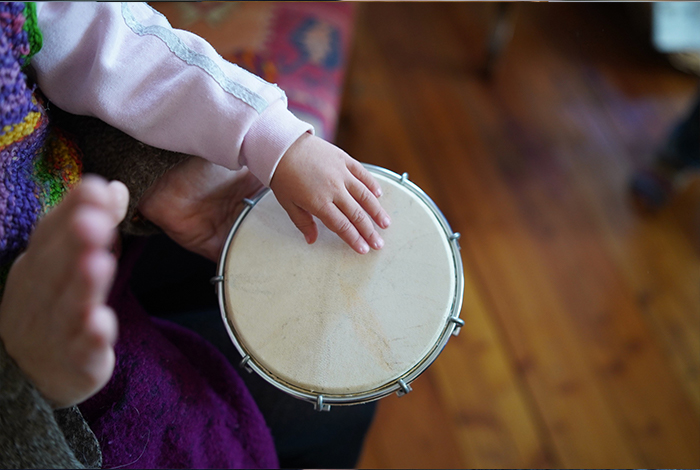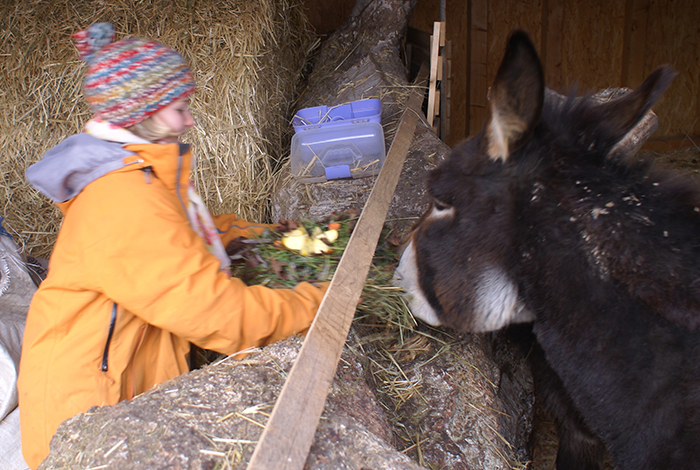Our cornerstones
At Ananda, the original, deep connection and love for nature is lived and experienced in the rhythm of the seasons. The focus is on experiencing with all the senses. We are in a shared cycle with all plants and animals. Awareness and empathy are created for everything living around us in order to live in harmony with one another. It is created from what nature provides us. This helps us to understand the connections holistically. This creates a deep awareness of our existence and mindfulness of the world around us.
At Ananda, we strive to enable learners to have a secure and positive bonding experience with caregivers. A stable relationship with caregivers creates a foundation and a framework on which a positive learning experience can be built. Learning companions and learners receive explicit support for self-reflection and personal development, such as supervision. Conflict-ridden processes are resolved with mediation if necessary and interpersonal relationships are strengthened through non-violent communication.
At ANANDA, "spirituality" is understood as a universal, but also personal and individual path that leads to inner freedom and conscious acceptance of responsibility for one's own thoughts, feelings and actions. Each person is seen as the creator and designer of their own life, who is connected and connected to life. This connection includes the relationship with oneself, fellow human beings and nature and can include the relationship with a higher divine power. Higher universal values can emerge from this connection, such as mindfulness for fellow human beings and the environment, tolerance, gratitude, unconditional love, trust and the power of forgiveness. Spirituality allows each person their own perspective and way of life and focuses on what unites and connects the different existing worlds. In this way, it promotes understanding, leads to foresight and cosmopolitanism and thus becomes a peacemaker. In addition, spirituality also includes the balancing of the various inner forces and energies and, through confrontation with one's own self, leads to a more balanced life. Spirituality promotes an optimistic and positive attitude towards life.”
Nonviolent Communication (NVC), developed by Dr. Marshall Rosenberg, refers to a specific communication technique and an attitude, i.e. an inner attitude, in dealing with ourselves and others. The NVC method with its four communication steps can support us in our contact with others and serve as a guide for ourselves. The goal is to connect with our compassionate nature and then to build a connection with others from the heart. The attitude of nonviolent communication is based on the theory that everything we do is aimed at fulfilling universal human needs. Our feelings show us whether our needs are being met or not. NVC helps us to transform our linguistic expression and the way we listen. Reactions that come from habit become conscious responses. We are encouraged to express ourselves honestly and clearly while at the same time giving other people our respectful and empathetic attention. Rosenberg's vision is to create a world in which everyone's needs are heard and respected, and in which solutions and ways are sought to meet these needs in a socially acceptable way. To this end, Rosenberg provides many methods and tools that show how people can shape their communication in this context in a peaceful way. She trains us to carefully observe situations and to determine what bothers us, makes us sad or annoyed without making any judgments. We learn to perceive our needs and to formulate them in an empathetic way. So we don't think in terms of "right" and "wrong", but look to see whether the chosen strategy meets our own needs and those of other people. If this is not the case, we can look for other strategies that better meet the targeted needs of the actors.
At Ananda, the attitude of NVC is lived. The methods and steps of NVC are learned and practiced in depth by all members of the school community. This creates an empathetic, understanding and appreciative atmosphere in everyday school life.

Sustainability means that current generations shape their lives in a mindful way so that future generations are not restricted in their ability to satisfy their needs. In this sense, sustainability is based on consideration, mindfulness, foresight and taking responsibility for current actions. Putting these goals into practice requires courageous and creative people who experience their own effectiveness, work with heart and soul to find solutions and have the courage to act. At Ananda, sustainability is strived for in all areas. The global goals serve as a guide for us.
A person is constantly interacting between their inner and outer world. It is therefore important that children and young people learn to look within in order to discover their gifts, abilities, strengths and weaknesses, but also to learn to express and behave appropriately and authentically in a social context. Learners need spaces of experience that allow them to do both. Ananda's offers and methods give the learner the freedom to temporarily withdraw into the "I" or to connect with other children and young people or adults in the "WE". In this way, the learner learns about his or her personal boundaries, or to expand them, and to follow his or her needs for closeness or distance.
Democracy is at the heart of Ananda. Students and adults meet on an equal footing and are invited to help shape life at Ananda. The democratic approach is expressed in the fact that students are given the opportunity to shape their learning process individually and in a self-organized manner, and students also have a say in the weekly school assembly, where everyday school issues are discussed and decided upon together. They can also be elected to school committees that decide on more far-reaching issues. Systemic consensus comes into play when making decisions.
At Ananda, learners should be able to independently plan and design their own individual learning plan in line with their current interests and, if necessary, with the support of a learning companion. In this way, they learn to control and organize their own learning process. If the learner's learning needs are taken into account and are accompanied in a sensitive manner, the learner can absorb learning content within a short time due to their natural thirst for knowledge, curiosity and enthusiasm. To implement their individual learning plan, the learner has access to study rooms, projects and the school environment in the spirit of "open teaching".
There are no year groups at Ananda. Learning takes place in mixed-age groups. This means that children and young people of all ages can interact with each other, inspire each other and enrich and support each other in the learning process.
Free play is the original form of learning. In free play, people can give free rein to their own creativity. They choose the type of game and the materials they use to express themselves in the game. The learners enter experiential spaces in which they can take up and process experiences they have had. They also learn to sense their individual needs and connect with them.
Because of a non-judgmental approach to each other, there are no grades at Ananda.
At Ananda, students do not receive homework.
In order to provide students and adults at Ananda with a radiation-reduced space, Ananda only has wired telephones and wired internet. Cell phones are switched off or in airplane mode.
Exercise promotes physical and mental development as well as people's health and is important for emotional balance.
At Ananda, students have access to a wide range of movement activities. On the one hand, they have the opportunity to organize movement games themselves or initiate them under supervision as needed. On the other hand, there are opportunities for holistic forms of movement such as yoga.
In their own kitchen, the students learn about a healthy, sustainable and vegetarian diet.
At Ananda, celebrations are an integral part of creating a positive culture of life.

